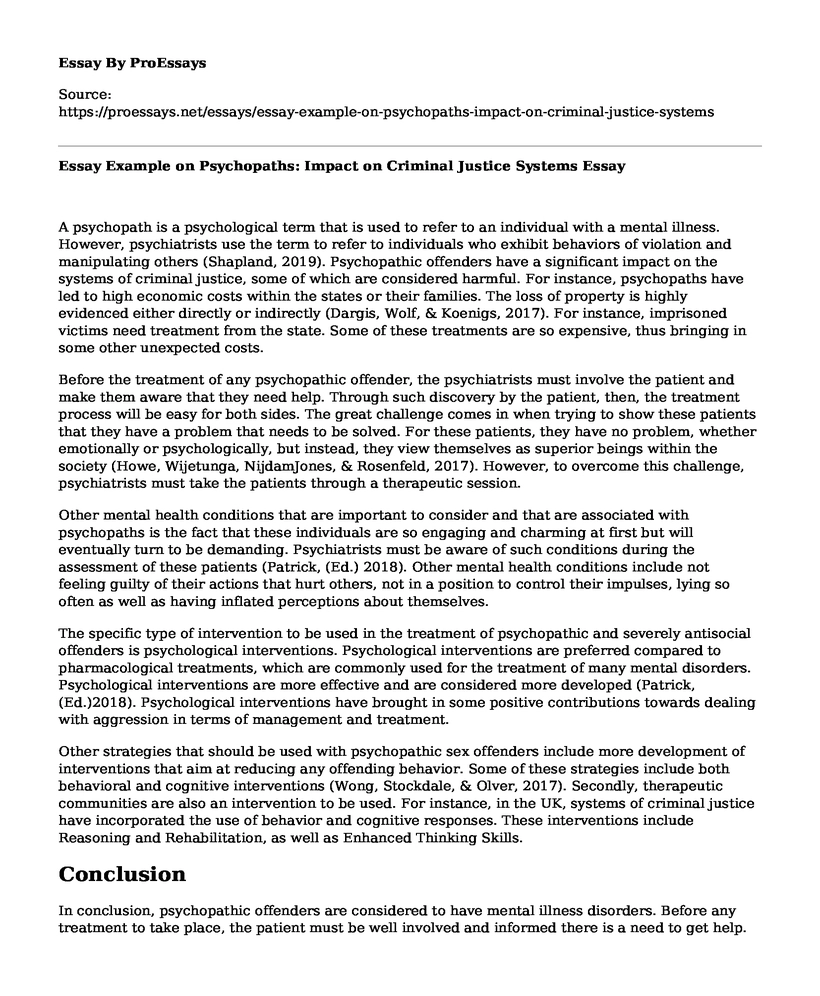A psychopath is a psychological term that is used to refer to an individual with a mental illness. However, psychiatrists use the term to refer to individuals who exhibit behaviors of violation and manipulating others (Shapland, 2019). Psychopathic offenders have a significant impact on the systems of criminal justice, some of which are considered harmful. For instance, psychopaths have led to high economic costs within the states or their families. The loss of property is highly evidenced either directly or indirectly (Dargis, Wolf, & Koenigs, 2017). For instance, imprisoned victims need treatment from the state. Some of these treatments are so expensive, thus bringing in some other unexpected costs.
Before the treatment of any psychopathic offender, the psychiatrists must involve the patient and make them aware that they need help. Through such discovery by the patient, then, the treatment process will be easy for both sides. The great challenge comes in when trying to show these patients that they have a problem that needs to be solved. For these patients, they have no problem, whether emotionally or psychologically, but instead, they view themselves as superior beings within the society (Howe, Wijetunga, NijdamJones, & Rosenfeld, 2017). However, to overcome this challenge, psychiatrists must take the patients through a therapeutic session.
Other mental health conditions that are important to consider and that are associated with psychopaths is the fact that these individuals are so engaging and charming at first but will eventually turn to be demanding. Psychiatrists must be aware of such conditions during the assessment of these patients (Patrick, (Ed.) 2018). Other mental health conditions include not feeling guilty of their actions that hurt others, not in a position to control their impulses, lying so often as well as having inflated perceptions about themselves.
The specific type of intervention to be used in the treatment of psychopathic and severely antisocial offenders is psychological interventions. Psychological interventions are preferred compared to pharmacological treatments, which are commonly used for the treatment of many mental disorders. Psychological interventions are more effective and are considered more developed (Patrick, (Ed.)2018). Psychological interventions have brought in some positive contributions towards dealing with aggression in terms of management and treatment.
Other strategies that should be used with psychopathic sex offenders include more development of interventions that aim at reducing any offending behavior. Some of these strategies include both behavioral and cognitive interventions (Wong, Stockdale, & Olver, 2017). Secondly, therapeutic communities are also an intervention to be used. For instance, in the UK, systems of criminal justice have incorporated the use of behavior and cognitive responses. These interventions include Reasoning and Rehabilitation, as well as Enhanced Thinking Skills.
Conclusion
In conclusion, psychopathic offenders are considered to have mental illness disorders. Before any treatment to take place, the patient must be well involved and informed there is a need to get help. Such patients are not guilty of their violent actions that hurt others; they often lie and are more demanding. Behavioral and cognitive interventions should be incorporated into dealing with psychopathic offenders. I agree with the takes discussed above because everything starts from the mind. Therefore having psychological interventions as the critical thing in treating the disorders is the best thing.
References
Shapland, S. (2019). Defining the elephant: a history of psychopathy, 1891-1959 (Doctoral dissertation, Birkbeck, University of London).
Howe, J., Wijetunga, C., NijdamJones, A., & Rosenfeld, B. (2017). Treatment of the Psychopathic Personality. The Wiley Handbook of Violence and Aggression, 1-12.
Patrick, C. J. (Ed.). (2018). Handbook of psychopathy. Guilford Publications.
Dargis, M., Wolf, R. C., & Koenigs, M. (2017). Reversal learning deficits in criminal offenders: effects of psychopathy, substance use, and childhood maltreatment history. Journal of psychopathology and behavioral assessment, 39(2), 189-197.
Wong, S. C., Stockdale, K. C., & Olver, M. E. (2017). Violence Reduction Treatment of Psychopathy. The Wiley Handbook of Violence and Aggression, 1-14.
Cite this page
Essay Example on Psychopaths: Impact on Criminal Justice Systems. (2023, Apr 09). Retrieved from https://proessays.net/essays/essay-example-on-psychopaths-impact-on-criminal-justice-systems
If you are the original author of this essay and no longer wish to have it published on the ProEssays website, please click below to request its removal:
- Essay on Anorexia Nervosa
- Closing Submission for the Prosecution Paper Example
- Scarcity of Resources in Healthcare Paper Example
- Pursuing a Master Program Criminology Essay Example
- Essay Example on the Unfamiliar History of Dissociative Identity Disorder (DID)
- Essay Example on Gun Control in the US: Controversy and History
- COVID-19 and Prison System - Report Example







